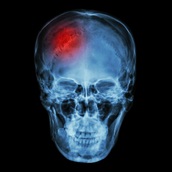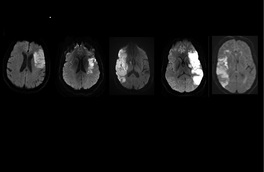Stem cell therapy may aid stroke recovery
A stroke therapy that infuses stem cells into the damaged sections of the brain may help boost recovery after a stroke, according to a pilot study by Imperial College London.

Five patients received this treatment within seven days of a stroke and were then monitored for six months after. Four out of five patients had had the most severe type of stroke; only four per cent of patients of this kind of stroke are expected to be alive and independent six months later. In the trial all four patients survived and three were independent within half a year. And with some help all five were mobile and could take part in everyday tasks.
Dr Soma Banerjee, the study’s lead author and a consultant in stroke medicine at Imperial College Healthcare NHS Trust, said: “The improvements we saw in these patients are very encouraging, but it’s too early to draw definitive conclusions about the effectiveness of the therapy.
“We need to do more tests to work out the best dose and timescale for treatment before starting larger trials.”
Dr Madina Kara, neuroscientist at The Stroke Association, said: “In the UK, someone has a stroke every three and half minutes, and around 58 per cent of stroke survivors are left with a disability.
One of the few existing treatments which can limit brain damage caused by stroke is thrombolysis. However, this drug can only be used to treat strokes caused by blood clots. There is an urgent need for alternative treatments to help prevent the debilitating impact of stroke.
“Previous studies have shown that a type of stem cell shows promise to aid stroke recovery. These latest results suggest that this type of treatment could be administered safely and we’re looking forward to seeing the outcomes of further studies to see exactly how they are aiding recovery.

“This is one of the most exciting recent developments in stroke research. It’s still early days in stem cell research but these findings could lead to new treatments for stroke patients in the future.”
This stroke therapy uses a type of cell called CD34+ cells, a set of stem cells in the bone marrow that give rise to blood cells and blood vessel lining cells. Previous research has shown that treatment using these cells can significantly improve recovery from stroke in animals. Rather than developing into brain cells themselves, the cells are thought to release chemicals that trigger the growth of new brain tissue and new blood vessels in the area damaged by stroke.
More than 150,000 people have a stroke in England every year. Survivors can be affected by a wide range of mental and physical symptoms, and many never recover their dependence.
Latest News
 29-Jul-24
Dementia Bus gives carehome.co.uk staff insight into life with dementia
29-Jul-24
Dementia Bus gives carehome.co.uk staff insight into life with dementia
 01-Mar-24
Find out the top care homes in 2024
01-Mar-24
Find out the top care homes in 2024
 21-Mar-23
UK's top care homes in 2023 revealed
21-Mar-23
UK's top care homes in 2023 revealed
 03-Jan-23
carehome.co.uk launches free care helpline
03-Jan-23
carehome.co.uk launches free care helpline
 13-Dec-22
5 mins with Emily Whitehurst, chief operating officer for Constantia Healthcare
13-Dec-22
5 mins with Emily Whitehurst, chief operating officer for Constantia Healthcare